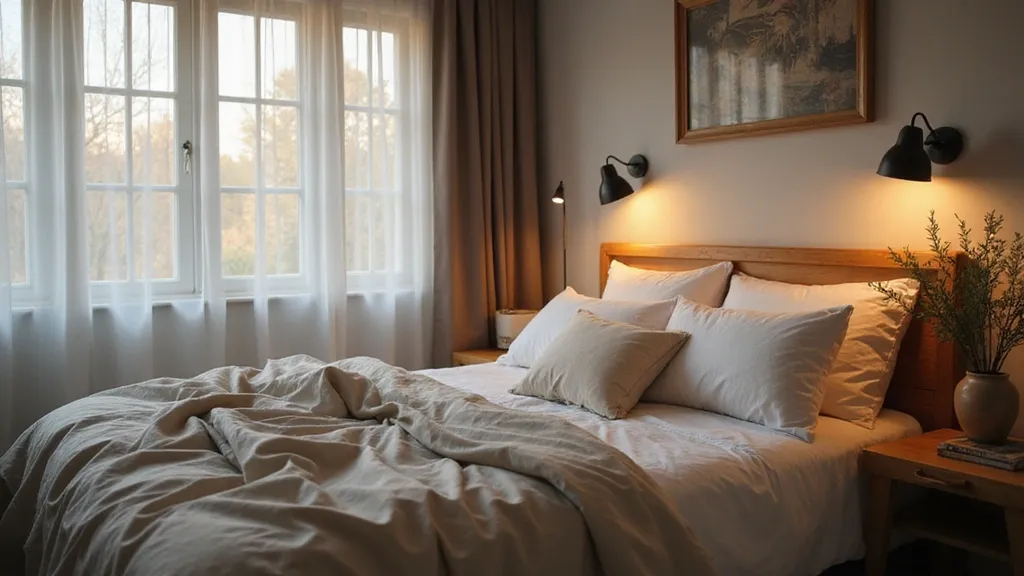13 Better Sleep Tips You Need to Try Tonight (Trust Us, #2 Works Wonders!)

Do you find yourself tossing and turning at night, craving a good night's sleep? You're not alone. With busy lives and constant distractions, getting the rest your body craves can feel like an uphill battle.
Imagine waking up refreshed and rejuvenated, ready to tackle the day ahead. This isn't just a dream; it's possible with some simple adjustments to your nightly routine. From creating a cozy sleep environment to exploring calming bedtime rituals, these better sleep tips will guide you to the blissful slumber you deserve. Say goodbye to sleepless nights and hello to a tranquil bedtime routine—let's dive into these 13 must-try sleep tips!
1. Set a Sleep Schedule

Consistency is key when it comes to sleep. Going to bed and waking up at the same time every day helps regulate your body's internal clock. This means you’ll feel more energized during the day and ready to catch those Z's at night.
Try to establish a bedtime that allows for at least 7-9 hours of sleep. Use reminders on your phone to signal when it’s time to wind down. Keep in mind that even on weekends, maintaining your sleep schedule can help improve your sleep quality overall. Don’t forget to carve out some quiet time before bed to help signal to your body that it’s time to relax and prepare for sleep.
Here are some tips for sticking to your schedule:
- Set alarms for both bedtime and wake-up time.
- Avoid naps longer than 20 minutes during the day.
- Limit screen time an hour before bed to help your body naturally wind down.
By establishing a solid schedule, you’ll set the foundation for better rest and rejuvenation each night.
2. Create a Cozy Sleep Sanctuary

Your sleep environment significantly impacts how well you rest each night. Transform your bedroom into a cozy sanctuary that promotes relaxation and comfort.
Start by decluttering your space. A tidy environment can help reduce stress and promote peace. Next, invest in comfortable bedding that feels like a cloud when you snuggle in. Include blackout curtains to block out any lingering light and consider adjusting the room's temperature to a cool setting, which is known to facilitate better sleep.
Consider adding calming elements such as calming scents, soft lighting, or a white noise machine to drown out distractions. Plush rugs and cushions can enhance the coziness factor too.
for creating your sanctuary:
- Use lavender or chamomile essential oils to promote relaxation.
- Add some houseplants to purify the air and bring in nature's calm.
- Personalize your space to reflect your personality, so it feels like a true retreat.
A cozy sleep sanctuary is a game-changer in your pursuit of restful nights. Trust us, #2 works wonders!
3. Limit Caffeine and Heavy Foods

What you consume before bedtime can either enhance your sleep quality or hinder it. Caffeine and heavy foods are two culprits that can disrupt your sleep cycle.
Try to limit caffeine intake in the afternoon and evening. Even a cup of coffee after lunch can keep you tossing and turning at night. Instead, opt for calming herbal teas, like chamomile or peppermint, which can promote relaxation and digestion.
As for food, heavy or spicy meals can cause discomfort that may keep you awake. Aim to have your last meal at least 2-3 hours before bedtime. If you're hungry before bed, choose light snacks like yogurt, nuts, or a banana—these can help satisfy your cravings without weighing you down.
Remember:
- Alcohol can initially make you sleepy but disrupts sleep later in the night, so enjoy it in moderation.
- Keep track of what you eat and drink to identify any patterns that might be affecting your sleep.
By making mindful choices about your diet, you’ll pave the way for restful nights and rejuvenating mornings.
4. Establish a Relaxing Pre-Sleep Routine

How you wind down each evening plays a crucial role in your ability to fall asleep. Creating a pre-sleep routine signals your body that it's time to relax and get ready for bed.
Consider activities that calm your mind and body—think reading, gentle stretching, or even a warm bath infused with calming bath oils. Disconnect from technology at least 30 minutes before bed to reduce exposure to blue light, which can interfere with melatonin production.
Incorporate mindfulness practices such as meditation or deep breathing exercises to quiet your mind and help you transition into sleep mode. Journaling can also be an excellent way to clear your thoughts and reflect on your day.
Customize your routine by:
- Experimenting until you find activities that soothe you the most.
- Keeping your routine consistent to reinforce a calming mindset.
- Preparing your sleep environment as part of the ritual, like dimming the lights or setting out your sleep essentials.
A relaxing pre-sleep routine can significantly enhance your quality of rest and promote rejuvenation.
5. Embrace Natural Light During the Day

It might seem counterintuitive, but getting enough natural light during the day can improve your sleep at night. Exposure to sunlight helps regulate your body's sleep-wake cycle and boosts melatonin production when the sun sets.
Try to spend some time outdoors, especially in the morning. Whether it’s going for a walk, sipping your morning coffee on the patio, or simply opening your blinds, soaking up natural light can help you feel more awake and energized. If you work indoors, consider taking breaks outside or near windows when possible.
Incorporate these strategies:
- Take a walk during your lunch break for maximum exposure to sunlight.
- Combine natural light with physical activity to enhance your mood and vigor during the day.
- Avoid staying in dimly lit spaces for long periods, especially in the mornings.
By embracing natural light, you’ll help your body naturally synchronize its internal clock, leading to more restful nights.
6. Manage Stress Effectively

Stress can be a major barrier to quality sleep. If your mind is racing with worries or to-do lists, it’s no wonder you struggle to drift off at night.
Finding effective ways to manage stress is essential for improving your sleep quality. Engaging in regular physical activity, practicing mindfulness techniques, or even talking to a friend about what's on your mind can help alleviate stress. Setting aside time for hobbies you enjoy can also provide a much-needed distraction from daily stressors.
Try these strategies to manage stress:
- Practice gratitude journaling to shift focus towards positive aspects of your life.
- Consider yoga or tai chi as gentle forms of exercise that incorporate mindfulness.
- Establish boundaries for work and personal time to keep stress levels in check.
By actively managing stress, you’ll create a more peaceful state of mind that is conducive to restful sleep.
7. Consider Sleep Aids Wisely

While many people turn to sleep aids for quick relief, it's important to consider them wisely and understand their potential effects. Over-the-counter or prescription sleep medications can sometimes mask underlying issues rather than address them.
If you're considering sleep aids, consult your healthcare provider first. They can guide you on safe options that might work for you. In the meantime, explore natural remedies like melatonin supplements, which can help regulate your sleep-wake cycle.
Here are some considerations for sleep aids:
- Discuss any potential side effects or interactions with other medications you're taking.
- Incorporate lifestyle changes alongside sleep aids for a more holistic approach to better sleep.
- Keep a sleep diary to monitor how different aids affect your rest quality over time.
Approaching sleep aids thoughtfully can empower you to make informed decisions about your sleep health.
8. Keep Electronics Away from the Bedroom

In our tech-driven world, it can be tempting to bring your devices into bed. However, keeping electronics away from your sleeping sanctuary can significantly improve your sleep quality.
Screens emit blue light, which can interfere with melatonin production and disrupt your body's natural sleep-wake rhythm. Plus, the stimulation from social media notifications or binge-watching can keep your mind racing long after you've put your device down.
Consider establishing a tech-free zone in your bedroom. Charge your devices outside the room or create a designated charging station elsewhere. Instead, fill your bedside table with books or soothing items that promote relaxation.
for a tech-free bedroom:
- Set specific times when devices are turned off to reduce temptation.
- Use traditional alarm clocks instead of relying on your phone.
- Cultivate a habit of reading or journaling in bed instead of scrolling through screens.
By disconnecting from technology before bedtime, you’ll create a more peaceful environment conducive to sleep.
9. Stay Active During the Day

Regular physical activity is a powerful way to promote better sleep. It can help regulate your circadian rhythm, reduce stress, and improve overall energy levels.
Aim for at least 30 minutes of moderate exercise most days, whether it's a brisk walk, cycling, or dancing around your living room. However, try to avoid vigorous workouts right before bedtime, as they might energize you instead of winding you down.
Here are some exercise tips to enhance sleep:
- Try to incorporate outdoor activities for the added benefit of natural light exposure.
- Mix up your routine with different forms of exercise to keep it enjoyable and engaging.
- Listen to your body and rest if you feel overly tired or sore.
By staying active during the day, you’ll not only boost your mood but also set the stage for peaceful and restful nights.
10. Limit Fluid Intake Before Bed

Staying hydrated is essential, but drinking too much before bedtime can lead to frequent trips to the bathroom, disrupting your sleep.
Try to limit fluid intake in the hour or two leading up to sleep. This will not only help prevent those late-night bathroom runs but can also improve overall sleep quality. If you’re thirsty before bed, sip a small amount of water or herbal tea instead of larger quantities.
To maintain hydration throughout the day:
- Carry a water bottle with you to encourage regular fluid intake.
- Set reminders to drink water, especially if you tend to forget during busy hours.
- Pay attention to signs of dehydration, such as dry skin or fatigue.
By managing your fluid intake wisely, you can enjoy uninterrupted sleep that allows for rejuvenation.
11. Use Relaxation Techniques

Incorporating relaxation techniques into your nightly routine can help ease your mind and prepare you for sleep. Techniques such as progressive muscle relaxation, deep breathing, or visualization can calm your body and reduce anxiety.
Consider trying guided meditations or soothing sounds to enhance your relaxation experience. There are plenty of apps and online resources to help you find the right techniques that resonate with you.
Here’s how to get started:
- Dedicate 5-10 minutes before bed to practice relaxation.
- Focus on your breathing, inhaling deeply through your nose and exhaling through your mouth.
- Experiment with different techniques until you find what works best for you.
By integrating relaxation techniques into your routine, you'll create a more peaceful mindset conducive to sleep.
12. Seek Professional Help When Needed

If you've tried several tips and still struggle with sleep, it may be time to seek professional help. Sleep disorders like insomnia or sleep apnea can require specific treatment and shouldn't be ignored.
Consulting with a healthcare provider can help identify any underlying issues affecting your sleep quality. They may recommend sleep studies to evaluate your sleep patterns and uncover any disturbances.
Here are signs it might be time to seek help:
- Persistent difficulty falling or staying asleep.
- Waking up feeling unrefreshed.
- Snoring or gasping for air during sleep.
By addressing sleep concerns with a professional, you can take steps towards better sleep health and rejuvenation.
13. Celebrate Small Wins

Improving your sleep is a process, and it's important to celebrate your progress along the way. Acknowledging even small wins—like falling asleep faster or waking up feeling a bit more rested—can keep you motivated and positive about your journey to better rest.
Consider keeping a sleep journal to track your nightly habits and improvements. Reflecting on how your practices are working can help you stay accountable and committed.
Here’s how to celebrate:
- Set achievable goals for your sleep routine.
- Reward yourself with self-care activities when you meet those goals.
- Share your victories with friends or family for encouragement.
By celebrating your sleep journey, you'll foster a positive mindset around rest and rejuvenation.
Conclusion

Better sleep isn’t just a luxury; it’s a necessity for a happy and healthy life. Implementing even a few of these tips can lead to more restful nights and energized days ahead.
As you embark on your journey toward better sleep, remember to be patient and kind to yourself. Each step you take is a move toward rejuvenation and well-being. So, which tip will you try tonight? Share your favorites in the comments below!




